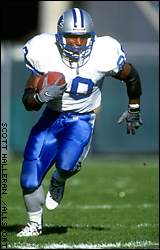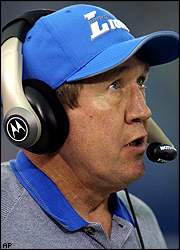|
|
|
Sanders' retirement decision unrelated to Ross
|
 |
 |
|
Barry Sanders is getting married this weekend in Detroit, but his divorce
with the Lions is final.
In other words, the decision by Lions coach Bobby Ross to retire on Monday
will not send Sanders out of retirement and back onto the Pontiac Silverdome turf.
|  | | Barry Sanders retired before the 1999 season despite being within striking distance of Walter Payton's career rushing record. |
"One of the first things I did Monday after getting a call [from the
media] was I called Barry," said David Ware, Sanders' Atlanta-based attorney.
"He hadn't heard about the coach. I told Barry that there were questions out
there about his future, and he said, 'Coach Ross had nothing to do with my
leaving. That has no effect on my decision.' "
This affirmed what Ross has maintained all along since Sanders shocked
the NFL with his retirement just prior to the 1999 season. It was not
Sanders, but his outspoken father, who had labeled Ross as a villain. William
Sanders either directly or indirectly hinted that Sanders wouldn't play
again unless Ross was either fired or the offensive scheme changed.
The general public has no way of knowing, but William Sanders is, well, a
loose cannon. His relationship with his son goes through periods of
estrangement, which I guess isn't all that uncommon. Let's just say that
Barry is much closer to his mother than his father.
The idea that Sanders wanted a new scheme was almost laughable. True, the
scheme may not keep opposing defensive coordinators from losing sleep, but
it's the same scheme that helped Sanders enjoy his greatest season of 2,053 yards
rushing in 1997.
Sanders was frustrated with a lot of things when he broke our hearts last
year. He was frustrated with losing. He was frustrated with decisions made by
Detroit management in allowing key veteran players to leave via free agency.
True, based on what I know, he wasn't enamored with Ross.
Yet based on what I know, Sanders and Ross have some things in common in
quitting when we least expected it.
Neither man felt they were making a difference anymore.
Sanders felt almost hopeless that there was nothing more he could do to
make the Lions a Super Bowl contender. When the Lions lost to Baltimore 19-10
for their fourth straight setback to finish the 1998 season with a 5-11
record, Sanders didn't see the point of going on, despite being within
striking distance of Walter Payton's career rushing record.
"I had never seen Barry so down as he was after the Baltimore game," said
Ware. "Not long after that, in January or February, he told me, 'I don't
think I'm going play anymore.' He had the attitude of, 'I can't just keep
picking up checks. I want a championship.'
"He was healthy when he retired, he was close to the record. But anybody
who saw how he competed Sunday, no matter what the down and distance was, he
tried to take it all the way all the time. Why? Not for the record. He wanted a
championship. Some people don't mind just picking up checks. Some people have
integrity. If Barry Sanders has nothing else, it's integrity."
Same deal with Ross. Just as Sanders is walking away from a ton of money,
Ross is turning his back on a salary that pays him almost $2 million per
year. But, like Sanders, Ross is not only frugal with his money, he is a man
of integrity who was driven by one thing -- perfection.
More than one Lions official said Monday the coach felt that despite his
legendary preparations, he no longer felt he was pushing his team to greater
heights.
|
“ |
[Sanders] said he didn't care about the record, which we already knew. He wasn't into it for the money and I always thought with Barry, [retirement] would be sooner than later. It wasn't about Bobby. ” |
|
|
— Lions GM Chuck Schmidt |
You see, Ross always saw results in his work, almost everywhere he had
coached. He made The Citadel competitive. He put Maryland on the map with
three ACC titles and four bowl trips. He took Georgia Tech to a national
title. He drove the San Diego Chargers to the Super Bowl.
When he took over the Lions in 1997, he inherited a roller-coaster team
that easily could go 10-5 one year and 5-11 the next. Despite great hopes,
little changed under Ross. The Lions went 9-7, 5-11 and 8-8. Sure, they made
the playoffs in '97; they did the same in '99, despite ending the year again
on four straight losses, not to mention their first-round playoff elimination.
It's almost a cliche to say that NFL coaches work endless hours. In some
cases, it's even an exaggeration. Anybody who knows Ross knows that he was
meticulous about his schedule, arriving each morning around 5:45 a.m. and
working until 11 p.m., almost without compromise. Even though others around
him encouraged him to try a different way, he knew no other way.
The Lions had high hopes this year. Injuries and inconsistent play have
put them in that oh-so-familiar wild-card playoff category with a 5-4 record.
When the Lions dropped a 23-8 home game to the Miami Dolphins, Ross saw
failure in himself. His team was almost listless. It did not fight. He had
tried everything, and it no longer worked. He felt the players were tuning
him out.
Ross' timing always seemed out of step in Detroit. He inherited Scott
Mitchell as a quarterback and gave him a go before turning to rookie Charlie
Batch in '98.
I remember talking to Ross at the end of that season, shortly after Christmas. He was consumed with evaluating what had gone wrong
during the 5-11 season. Some 24 players had failed physicals at the end of
the year. "Why," he wondered, "are we having so many injuries? Is it my fault?
I gotta find out."
Ross also felt the emotions I have heard expressed by the great ones,
like Bill Parcells and Jimmy Johnson. The wins were more difficult to enjoy;
the losses more excruciating than ever.
"Bobby got to the point where he literally tormented himself over each
loss," said Lions general manager Chuck Schmidt. "He felt his job was to get
the team ready to play, and he didn't know what else he could do. I think he
really believes that in some ways, he is helping the team by stepping aside now."
Another Lions official, borrowing from the Motor City theme expressed by
owner William Clay Ford, offered that, "Bobby ran out of gas. Plain and
simple. When you run your car at 90 mph, you eat up the fuel
faster. He couldn't go 45 mph. He had nothing left."
Ross, who will turn 64 next month, also has experienced health problems
in the past year. He had melanoma removed from his nose. Doctors discovered two
blood clots in his leg, which curtailed some of his activity in the offseason
and put him on medication.
Add it all up ... physically, emotionally and mentally and Ross was
clearly spent. Some people have called him a quitter. Those who really know
him would never think of it.
Part of that emotional toll probably can be linked to Sanders' departure.
During the offseason of '99 in which the running back contemplated walking
away from the game, Ross tried numerous times to call Sanders and wrote him
several letters to influence his return. It hurt him that Sanders never responded.
"Barry's different," explained Ware. "But when Barry retired, I talked to
coach Ross personally. He was so classy. He said that if there was anything
he could do to change Barry's mind, he would do it. Anything, he said. I'm
not saying he was going to turn the team over to Barry, but he was very gracious.
The truth is, there was nothing he could have done."
In fact, Schmidt said he finally was able to talk personally with Sanders
in October to determine why he retired.
"Barry said, 'Chuck, I have played football for 21 years without a
serious injury and I have a chance to get out with my health," recalled
Schmidt. "He said he didn't care about the record, which we already knew. He
wasn't into it for the money and I always thought with Barry, [retirement]
would be sooner than later. It wasn't about Bobby."
|  | | Lions coach Bobby Ross wasn't the reason Barry Sanders retired. |
Ware admits that he and Sanders' other agent, Lamont Smith of Denver,
likely will approach Sanders one last time at the end of the year to make
sure that he doesn't want to take one last crack at playing football again. (Sanders technically is under contract through 2001 and the team has until next March to pay him a $1 million for an option on 2002, but he is in the
process of repaying $5.4 million of his signing bonus, which the team claims
it sought for salary cap relief.)
Ware admits that a Sanders' comeback is very unlikely after missing two
seasons.
"You wouldn't think he could miss three years and come back, so that's
why we'll sit down with him at the end of the year, just to make sure," said
Ware. "But this is a guy who isn't motivated by records or money. I think
Barry's got money from his first contract. I think he probably still has his
third-grade lunch money."
Now Sanders is about to get married and settle into a family life. Ross
and his wife Alice have five kids of their own and 13 grandchildren, who no
doubt will be the focus of their lives now.
When I spoke with Alice briefly
on the telephone Monday morning, admittedly fishing for a lead, she never
revealed all, but she sure sounded happy and content -- a sign if there ever
was one that her husband was coming home for good.
No, Sanders won't play again, and Ross won't coach again. Funny, too, how
neither man bothered to explain their retirements in front of the media. Funny, but, not surprising.
Neither man ever was truly comfortable in the spotlight, but don't mistake that for anything other than humility and,
perhaps, an honesty that may be just too painful to share at this point in their lives.
|
|
|
|




